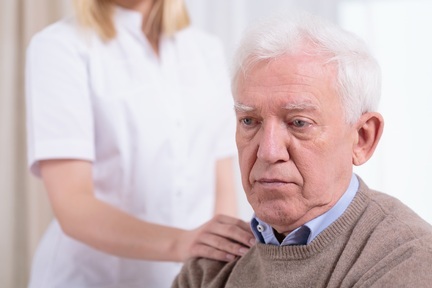Suicide and dementia: 'I possibly don't fear dementia like some people do, because I'm prepared for it'
Dementia expert, Professor June Andrews, has revealed that she doesn’t fear dementia, despite knowing that if she lives to 90, she will have 50 per cent chance of getting the disease.

There are around 850,000 people living with dementia in the UK and as public awareness of the disease grows, so too does people’s fear of it. It seems the idea of forgetting who our friends and family are, is anathema to us, with dementia becoming the most feared disease even more than cancer. It is also now the leading cause of death in Britain.
At the beginning of this year, a psychiatrist revealed he had helped six Britons with dementia to end their lives at Swiss assisted suicide clinics, by verifying they were mentally capable of choosing to die. He claimed they couldn’t face “gradual annihilation of their personalities”.
However, Baroness Ilora Finlay, a professor of palliative medicine, is concerned that people with dementia may be acting out of fear, as they cannot know how severe their dementia will become.
Professor Andrews who spent a decade as the head of Stirling University's Dementia Services Development Centre, and wrote the book ‘Dementia: The One Stop Guide, addresses the controversial subject of suicide and dementia in her blog.
She thinks “for some of the people who fear dementia, their fear is not about old age and frailty itself but what they’ve seen of poor care provision”.
'Indignity is not inevitable'
However she says: “Indignity is not inevitable” and adds “If the care given by health and social care services is ineffective and humiliating we need to improve it and it can always be improved. Care providers can always sharpen up, whether they are working in the private or public sector. I hate the idea that anyone would kill himself or herself just because dementia care is unkind or humiliating.”
Professor Andrews recognises that some people feel they should kill themselves so they are not a financial or emotional burden on their families.
“Unlike other conditions in the UK, dementia is very expensive. People might think that they would be better dying quickly, than impoverishing the family by paying for a lingering care home placement. Rather than fearfulness, that person might think of it as self-sacrifice.”
She is concerned that when the media publicizes a suicide as being because of dementia, it puts pressure on people who are struggling on with life with the disease.
Euthanasia
She worries it could strengthen the argument for euthanasia and might count as evidence that people with dementia don’t value life? “It is a short step from ‘They don’t value life….’ to ‘They can’t value life….’ and then to ‘They don’t deserve to live’.
“Publicizing a suicide related to a particular disease is like laying a landmine…you can’t be sure who is going to step on it or what the result will be. Rage is OK. Like anyone else, the suicide is entitled to rage. But it’s not a thoughtful comment on how other people should respond to Alzheimer’s. Knowing how to stay well for as long as possible is vital,” she says.
Misconceptions are generating fear
The Alzheimer’s Society is equally concerned that there are so many misconceptions about dementia that it is generating a huge fear of the disease, causing some to take their own lives as a result.
During National Dementia Awareness Week last year, its chief executive, Jeremy Hughes, said: “Dementia has overtaken cancer as the health condition people are most afraid of. You can live quite well with dementia, it is not a death sentence. With the support of the Alzheimer’s Society, you can live a good and fulfilled life, and we need to get over that fear and that stigma that still exists that dementia is the end of life.”
In the Netherlands, it is legal for people with dementia to ask for euthanasia and the study ‘Dementia and assisted suicide and euthanasia’ revealed that the number of these deaths has risen in the last five years. It is now legal there for doctors to carry out euthanasia on people with dementia who had previously signed a consent form for when the ‘time was right’.

However, this has already caused problems with the recent case of a Dutch doctor asking the family of a woman with dementia to hold her down as she was given a lethal euthanasia injection.
The woman who was in a care home woke up from a sleep-inducing drug and started to struggle during the injection. She had signed a consent form for euthanasia when her dementia was at an early stage.
The majority of people in the UK are in favour of having the right to die, with the largest ever survey held on assisted suicide in 2015, finding 82 per cent were in favour.
'Visceral horror' of suicide
Professor Andrews admits she has a “visceral horror” of suicide and says: “I possibly don’t fear dementia like some people do, because I’m prepared for it. I want to make it to 90 and by then I have a 50 per cent chance of having it as a female. I can imagine having my thoughts limited to a loop of familiar music, a comfy little bedroom and waiting for meals. Of course I can’t really say now what I will feel like then.
“My family are well instructed so they will be able to avoid precipitating the worst sort of disturbing behaviour that I might show. They can afford to keep me fed and safe after I stop being economically productive; unable to babysit or cook.”
She does add: “Of course if I do get it, I won’t be doing cartwheels of joy. It will be really sad; like many aspects of ageing are sad. I know it’s not normal ageing but a disease. However, it does not hurt as much as pancreatic cancer or cause nightmare breathing difficulties like emphysema. So if fate dishes me up this disease, I don’t think it would be the one most likely to make me suicidal.”
To read Professor June Andrews' blog on the issue go to http://juneandrews.net/blog/post.php?s=2016-12-26-suicide-and-dementia
Latest Features News
 25-Nov-19
2019 Election: Boris Johnson leaves social care in 'too difficult box' but Labour vows to end 'crisis'
25-Nov-19
2019 Election: Boris Johnson leaves social care in 'too difficult box' but Labour vows to end 'crisis'
 18-Oct-19
Podcast: Wendy Mitchell and dementia: 'My biggest fear is not knowing who my daughters are'
18-Oct-19
Podcast: Wendy Mitchell and dementia: 'My biggest fear is not knowing who my daughters are'
 27-Sep-19
Exclusive: Care minister backs care workers' call for time off to grieve and attend funerals
27-Sep-19
Exclusive: Care minister backs care workers' call for time off to grieve and attend funerals
 19-Sep-19
Podcast: Gyles Brandreth says poetry helps ward off dementia
19-Sep-19
Podcast: Gyles Brandreth says poetry helps ward off dementia
 30-Aug-19
Edinburgh Fringe funnyman joins comics facing toughest audience at care home gig
30-Aug-19
Edinburgh Fringe funnyman joins comics facing toughest audience at care home gig